Thames Valley East IN THIS ISSUE Back to School What’s On Autumn Fun





mbers and addresses.
this stage charged for.
r to amend or approve your
Thames Valley East
T: 01628 627586






mbers and addresses.
this stage charged for.
r to amend or approve your
Thames Valley East
T: 01628 627586
E: editor@familiestveast.co.uk
HOWLAND TUTORS (MAIDENHEAD/MARLOW and WINDSOR/SLOUGH areas)
Expanding local agency (established in 1998 and owned by highly experienced teachers) offers individual tuition in twenty subjects including: all primary; Biology, Chemistry, Economics, English, French, Geography, History, Latin, Maths and Physics Further tutors welcome
Tel (01628) 477164
www howlandtutors co uk
HOWLAND TUTORS (MAIDENHEAD/MARLOW and WINDSOR/SLOUGH areas)

Expanding local agency (established in 1998 and owned by highly experienced teachers) offers individual tuition in twenty subjects including: all primary; Biology, Chemistry, Economics, English, French, Geography, History, Latin, Maths and Physics Further tutors welcome Tel. (01628) 477164
www howlandtutors co uk


®
50 All Saints Avenue , Maidenhead, Berkshire , SL6 6NA
Congratulations! You made it through the summer holidays and now it’s time to go back to school! We hope it all goes smoothly, especially if you have got a child transitioning into nursery, primary or secondary settings.
Education is, of course, key in our September/October Issue. If you are looking for an independent school or nursery do check out page 8 for our ‘Open days diary’. We also have ‘Ten top tips for attending school open days’ on page 9. Other highlights include; ‘Celebrating different learning styles’ on page 11, ‘Making the most of Parents’ Evenings’ on page 13 and ‘Age appropriate reading’ on page 15. Plus don’t miss our interview with the headmistress of Upton House school on page 12
Please find below a proof of your advertisement for the Nov/Dec 2019 issue (No. 105) of Families T VE.
For our Early Years children, we have some interesting articles on ‘Sensory play’ on page 17, ‘Toddler tantrums’ on page 18 and do take a read of ‘Support your child swimming’ on page 19.
We also take a look at ‘Girl Guiding and Scouts today’ on page 21 and as ever we have listed lots of places and things to do for families in our ‘What’s On’ columns on pages 22 and 23, so you can give yourselves something to look forward to in the autumn months.
Please CHECK ALL INFORMATION IS CORRECT especially dates, telephone numbers and addresses
Until the next issue, have fun!

Any changes need to be made at this stage Any further amendments will be charged for
Please contact us by return either to amend or approve your advertisement
Editors: Rachel Bailey & Anna Collins 01628 829761 / 01628 788058
Next Issue: Nov / Dec 2023
Tel: 01628 829761 / 01628 788058
Circulation: 17,000
Cover image: depositphotos.com
Families Thames Valley East is part of Families Print Ltd, a franchise company. All Franchised magazines in the group are independently owned and operated under licence. Families is a registered trademark of LCMB Ltd. Remenham House, Regatta Place, Marlow Road, Bourne End, Bucks, SL8 5TD. The contents of Families Thames Valley East are fully protected by copyright and none of the editorial or photographic matter may be reproduced in any form without prior consent of Families Thames Valley East. Every care is taken in the preparation of this magazine but the franchise company, Families Print Ltd and Lifecycle Marketing cannot be held responsible for the claims of advertisers, nor for the accuracy of the contents, or any consequence thereof.
Editor@FamiliesTVEast.co.uk www.Familiesonline.co.uk ENROLLING NOW

Singing, dancing and acting classes for 4 - 18 year-olds





ASCOT 01344 206466 ascot@stagecoach.co.uk
HENLEY AND MARLOW 07539753718 henleyandmarlow@stagecoach.co.uk
MAIDENHEAD 01628 281128 maidenhead@stagecoach.co.uk

BRACKNELL NORTH (WARFIELD) 07368 849169
bracknellnorth@stagecoach.co.uk
HIGH WYCOMBE 07539753718 highwycombe@stagecoach.co.uk
WINDSOR AND LANGLEY 01932 988086 windsor@stagecoach.co.uk
Young siblings Onkaar (12) and Avneet (10) aim to celebrate young people in their drive to improve youth mental health and well being.

Their mission is to encourage young people to be Mindful, Appreciative and Driven and their M.A.D team aims to do just that! Run by children for children and their adults, they offer activities and workshops to help develop these essential life skills and inspire young leaders to make a difference. As published authors, they have already written three books on the subject, the latest of which, ‘Everyday Mindset’, published earlier this year and was written to help encourage young people to develop a growth mindset. As part of their ongoing work, they have organised a unique award ceremony - the SHINE awards - which will take place on Saturday 11 November at the Bourne Hall, Epsom KT17 1UF from 2-5pm.
The purpose of the awards is to celebrate the achievements of young people across the globe, whilst raising money for charity. There are six award categories and nominations close at midday on 30 September.
If you would like to nominate a young person who shines, visit www.themadteam.co.uk/shineawards
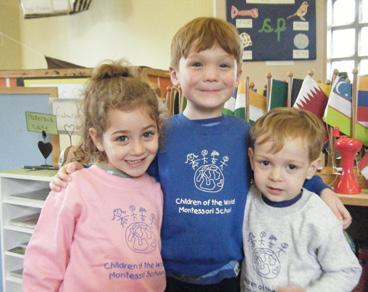
Monkey Puzzle in Maidenhead are showing parents that they can offer flexibility to different working patterns, by offering term-time only contracts, as well as other options.
As many parents seek to work term-time to fit with education timetables, particularly within schools, nursery child care to match is becoming more sought after.

Prerna, the manager at the Maidenhead nursery comments, “The pandemic has caused a shift in flexible working and this is one way in which we can help. Also, many of our parents may work in schools as teachers and TAs or in other forms of childcare themselves, so this way we can also provide for their needs.”
She continues:

Leighton Park’s Fryer Project Qualification (FPQ) Expo 2023, the culmination of the two-year ‘Approaches to Learning’ programme, showcases the school’s commitment to fostering a spirit of inquiry. The experience develops critical thinking and cultivates practical skills, essential for lifelong learning. This year, the qualification engaged all Year 8 students.
The uniqueness of the FPQ lies in its student-driven nature. Participants were encouraged to choose their own research titles and questions, enabling them to delve into areas of personal interest and passion.
The chosen titles exhibited a wide range of interests, including thought-provoking inquiries such as ‘Will nuclear fusion ever be
“There are many ways that choosing the right nursery can create convenience for working parents. Assess the location; is it better to be close to work, home or a station? for example; Will you walk to the nursery or take a car on route to work? Does traffic work in your favour? How does the nursery update you while you are at work?”
The nursery welcomes parents to take a look at their setting on Grenfell road, close to Maidenhead Station. Contact them below to arrange a viewing.
www.monkeypuzzlemaidenhead.co.uk
commercially available’, ‘How does media manipulation work?’ ‘Picky eaters: nature or nurture?’ ‘Why do humans love cats so much?’ and ‘Should we have a global currency?’.
11-18 years. Co-educational. Day Boarding. TES Awards Independent School of the Year Finalist. Find out more about Leighton Park School and their unique approach at their next open morning.
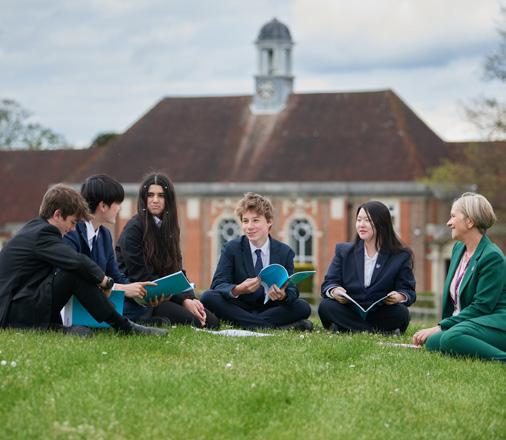

www.leightonpark.com/imagine-better
Windsor, SL4 6HX
01753 868399 or 01344 844592 Email:
Education
• 2½ - 5 year old classes



• 18 months – 2½ year old toddler class
• Baby, toddler and parent class





The performing arts is a wide and vibrant industry. Learning skills in theatre, dance, music and filmmaking can allow a child to build confidence, nurture creativity and learn important life skills, like teamwork and communication. With its breadth of disciplines, the arts can open up a world of possibility for young people to develop and grow in an environment that is safe and fun.
The Pauline Quirke Academy of Performing Arts believe that the performing arts can have a huge impact on the lives of young people. Each week, PQA students learn new skills and make new friends through their three core modules: Comedy & Drama, Film & Television and Musical Theatre. Through an ethos of ‘Be Yourself, Be Amazing’ students have the confidence to put themselves out there, the creativity to think differently and the community to feel supported whilst doing so.
The Pauline Quirke Academy of Performing Arts is enrolling now. This term, try something new and experience outstanding performing arts training at your local PQA.
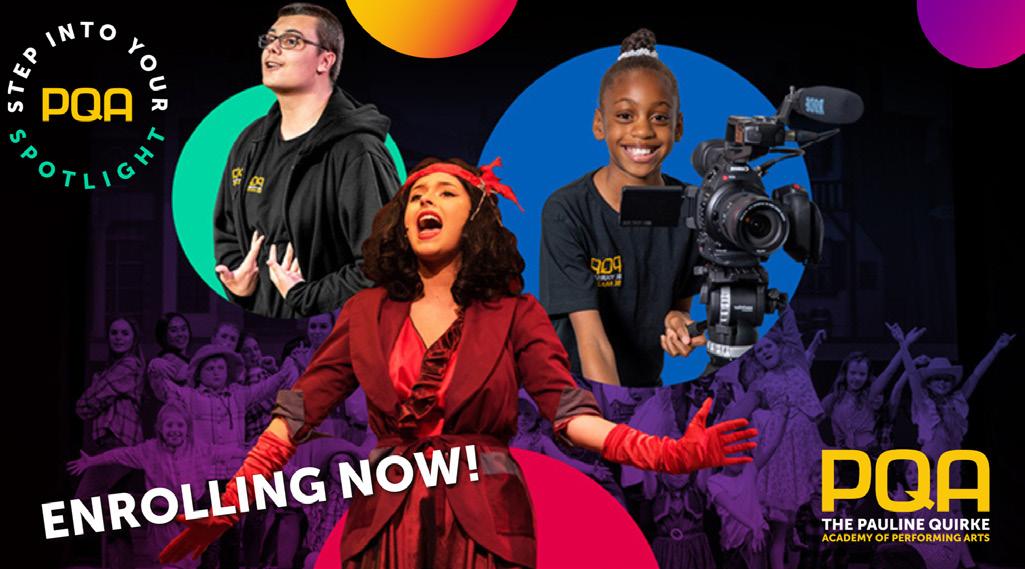
The park consists of a trampoline park with wall-to-wall trampolines, giant airbags, battle beams, wipeout, tumble tracks, and more. There is also a Soft Play Park for the smallest guests and younger siblings. If jumping isn’t your thing there is space to sit back and relax from the Jump In café as you watch the world defy gravity around you.
Open Jump sessions offer access to all areas for those aged 4+ years. On Friday & Saturday evenings, the disco lights are turned on and the music up during two hour Sunset Sessions. Younger bounce enthusiasts (ages 6 months to 6 years) can explore the park in a safe and fun environment during Toddler Takeover sessions. Jump In Slough is also a perfect place for an unforgettable birthday celebration. All of their party packages include a party host, party room (including decorations) and clean up. 100% fun for children and Zero stress for parents!
www.gojumpin.com/trampoline-park-slough


Odds Farm Park, near Beaconsfield, is giving children the opportunity to get involved with harvesting thousands of pumpkins during its annual Pumpkin Festival between 21st and 29th October. Over 7,000 pumpkin seeds were planted by farm workers in the spring ready for harvesting late autumn. Little ones can choose their own mini wheelbarrow before exploring the Oddlotment Pumpkin Patch to carefully select their own pumpkin to take home. The Carving Corner will be open for families keen to pimp up their pumpkin without having to take the mess home. Crafty visitors can also get stuck in at the autumn-themed arts and crafts area where there is plenty for younger guests to get creative with.
Louise Winslow, assistant general manager at Odds Farm Park, says: “We absolutely love the Pumpkin Festival here at Odds. It’s a riot of colour every year and always makes for some special family memories and social media shots for our visiting guests. We hope children and their parents will also enjoy the host of other pumpkin-related activities we have here including our Halloween trail around the farm.”
www.oddsfarm.co.uk
Perform classes use a mix of drama, dance and singing to bring out every child’s potential. Run by experienced actor-teachers, the classes focus on developing the 4 Cs: confidence, communication, coordination and concentration.
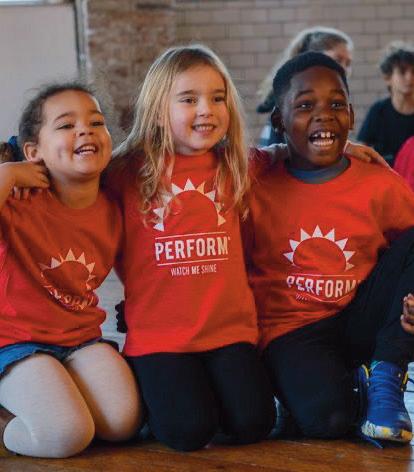
From September, Perform 4-7 year olds will take to the skies with Phileas Fogg as they go on an amazing adventure ‘Around the World’. Whether walking like a wallaby in the outback or revealing the legends of the Egyptian pyramids, the new term will be filled with globetrotting fun!
Meanwhile, 7-12 year olds are going to the ball in a rags-to-riches rock show, Cinderella Rocks. This hilarious version of Cinderella features struggling band, The Ugglies, in their quest to top the charts with charming music mogul, Simon Prince.
With all abilities welcome, the children will work towards an end of term performance for family and friends. The only requirement is to get ready to have the best fun of the week!
Visit www.perform.org.uk/try to book a FREE class today in:
NEW North Ascot Community Centre, Fernbank Road, Ascot, SL5 8LA
4-7s Saturdays 9.30am; 7-12s Saturdays 11.15am
St Peter’s Centre, 1 Thorney Lane North, Iver SL0 9JU
4-7s Tuesdays 4pm; 7-12s Tuesdays 5.05pm
Boyne Hill Infant School, Rutland Road, Maidenhead SL6 4HZ
4-7s Saturdays 9.30am; 7-12s Saturdays 11.15am
All Saints Church Hall, The Causeway, Marlow SL7 2AA
4-7s Mondays 4pm; 7-12s Mondays 5.05pm
Hilltop First School, Clewer Hill Road, Windsor SL4 4DW
4-7s Fridays 4pm; 7-12s Fridays 5.05pm
Maidenhead and Windsor
e: maidenhead.windsor@monkeymusic.co.uk
T : 01494 819138
Tuesdays - Cox Green Community Centre, Maidenhead, SL6 3AX
Thursdays - Maidenhead Community Centre, SL6 7HY
Fridays - All Saint's Church Dedworth, Windsor, SL4 4JW
Rock'n'Roll for babies from 3 months

Heigh-Ho for 1-2 year olds
Jiggety-Jig for 2 & 3 yr olds

Sharing precious time together
Virginia Water Community Centre, 3 Beechmount Ave, Virginia Water GU25 4EY
4-7s Mondays 4pm; 7-12s Mondays 5.05pm
4 Marlow Road Youth and Community Centre SL6 7YR
4-7s Fridays 4pm; 7-12s Fridays 5.05pm
Perform fun continues into the summer holidays.
More information and to book a free trial visit www.perform.org.uk/try
Or contact: T: 020 7255 9120 / E: enquiries@perform.org.uk



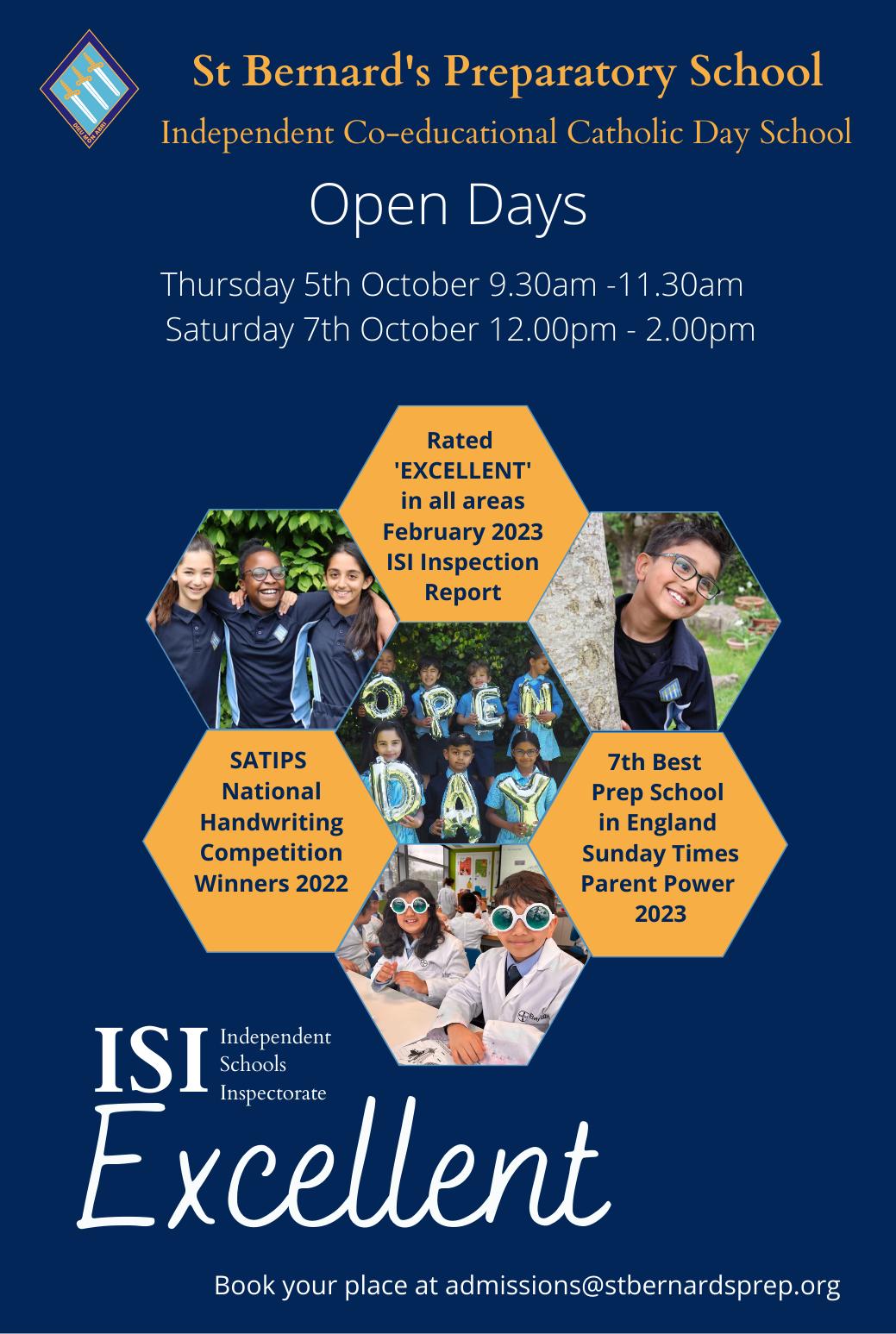

Please ring the school to check the Open Day or Evening is still going ahead.
ACS Egham International School
London Road, Egham TW20 0HS
Whole School Open Day (4-18yrs):
Saturday 30 September
9.30am to noon
To book a visit, contact below: 01784 430800 eghamadmissions@acs-schools.com www.acs-schools.com/egham
Claires Court for girls and boys from 2 to 18 years
Maidenhead locations
Senior Boys and Senior Girls Open Morning:
Friday 29 September
9.30am to 11.30am
To book your visit or personal tour contact below: registrar@clairescourt.com
01628 327710 www.clairescourt.com
Coworth Flexlands Prep School & Nursery
Chertsey Road, Valley End, Chobham, GU24 8TE
Friday 22 September
10am
To book a visit, contact below: 01276 855707 registrar@coworthflexlands.co.uk www.coworthflexlands.co.uk
Herries School Co-ed Preparatory School and Nursery
Dean Lane, Cookham Dean SL6 9BD
To book a visit, contact below: 01628 483350 admissions@herries.org.uk www.herries.org.uk
Highfield Preparatory School
2 West Road, Maidenhead SL6 1PD
Friday 29 September
9:30am
Friday 6 October (Preschool Activity Morning)
8:30am
Friday 17 November 2pm
Friday 24 November (Preschool Activity Morning)
8:30am
To book a visit, contact below: 01628 624 918 office@highfieldprep.org https://highfieldprep.org/admissions
Leighton Park School
Shinfield Road, Reading RG2 7DE
Saturday 23 September
Eton End
Friday 13 October
Friday 10 November 9.00 - 11am
St Bernard’s Preparatory School Hawtrey Close, Slough SL1 1TB
Thursday 5 October 9.30-11.30am
Saturday 7 October
12-2pm
To book a visit, contact below: 01753 521821 admissions@stbernardsprep.org www.stbernardsprep.org
St George’s School Windsor Castle Datchet Rd, Windsor SL4 1QF
Friday 22 September
Saturday 23 March 2024
Friday 17 May 2024
To book a visit, contact below: 01753 865553 enquiries@stgwindsor.org
www.stgwindsor.org
The Marist School Ascot Kings Road, Sunninghill, Ascot, SL5 7PS
Thursday 21 September (Senior Phase Open Evening)
Thursday 12 October (VI Form Open Evening)
Friday 3 November (Prep Phase Open Morning)
Please find below a proof of your advertisement for the Jan/Feb 2020 issue (No. 106) of Families T VE.
Sixth Form Open Evening:
35 Eton Road, Datchet SL3 9AX
Saturday 30 September
2-4pm
Tuesday 10 October 6.30pm
Taster Days for year 7 & 9 entry:
Thursday 12 October and 14 November (yr 7)
To book a visit, contact below: 01344 624291 admissions@themarist.com
www.themarist.com/admissions/openevents
Please CHECK ALL INFORMATION IS CORRECT especially dates, telephone numbers and addresses
To book a visit, contact below: 01753 541075 registrar@etonend.org www.etonend.org
Thursday 9 November (yr 9)
To book a visit, contact below: 0118 987 9600 admissions@leightonpark.com www.leightonpark.com/visit-leighton-park
Upton House School Windsor 115 St Leonard’s Road, Windsor Berkshire SL4 3DF
Any changes need to be made at this stage
Heathfield School
T: 07867 514138 / 07753 414605
Saturday 16 September (Virtual Open Morning)
10am
Any further amendments will be charged for
London Road, Ascot, Berks SL5 8BQ Whole School Open Mornings:

Saturday 7 October
Long Close School Upton Court Road, Slough SL3 7LU
E: editor@familiestveast.co.uk
Please contact us by return either to amend or approve your advertisement
Friday 15 March 2024

Saturday 11 May 2024
9.45am to 12 noon
Sixth Form Open Evening:
Wednesday 27 September
6-8.00pm
To book a visit, contact below: 01344 898342 admissions@heathfieldschool.net www.heathfieldschool.net
Monday 25 to Friday 29 September 10am - 12 noon
To book a visit, contact below: admissions@longcloseschool.co.uk www.longcloseschool.co.uk
We are an Ofsted rated ‘Outstanding ’ nursery providing high quality day care for children from three months to five years. Set within bright, modern Windsor Leisure Centre, our setting includes a large toddler room, pre-school room, a new snuggly baby room, and spacious outdoor garden.
To book, contact below: registrar@uptonhouse.org.uk 01753 862610
Little People Media, 29 Furrow Way, Maidenhead SL6 3 NY
www.uptonhouse.org.uk
Call
Open 51 weeks a year – Accepts 30 hours funding – Highly trained team
Come and look around today: Call: 01753 855543 or email: info@theriversidedaynursery.co.uk
www.theriversidedaynursery.co.uk
If you are looking ahead to your child’s first or next school, you have big decisions ahead. Do your homework now and the choices will become clearer, particularly when it comes to visiting your shortlist.
TOP TIPS: It can take a couple of visits to really nail your school choices. So attend Open Days for key schools two years in advance of your child’s start date so you have time to come back to an Open Day the following year. Bear in mind that independent schools are generally non-selective at Reception, so get your name on waiting lists early. It can be good to visit the school and see it in action on a school day too, if you can.
Here are Families’ tips for preparation and getting the most out of your visit.

Study the school’s website noting where the gaps are in your knowledge and which questions you want to ask at the Open Day. Are there particular entry requirements? How long is the school day? How many students per class? Are there taster sessions for children before the start of term? Make a list of questions covering the things that are a priority for your family. If your child is moving on to senior school, you may want to ask about things like mobile phone policy. If it’s a state school you are visiting, check your understanding of the catchment area, as these can change from year to year.
Are the pupils around you happy and smiling? If it’s a school day, are they enjoying each other’s company? Do they seem articulate, confident and polite? Are the staff warm, welcoming and personable? Do they talk passionately about their subjects? At primary schools, is there colourful artwork and children’s projects on display?
Schools very much reflect the personality, vision, values and ethos of the Headteacher. If the Head is giving a talk, you will get a real sense of these by attending. If you feel the Head speaks your language, it’s likely you will go on to like the school.
Often, groups of students are recruited to show parents around, particularly at senior school level. Ask these students the same questions you ask the teachers, looking out for differences in what you hear. Remember kids are known for saying it like it really is! Ask students how they found their first year? Worse thing and best thing? What is food like (very important to your child)!
Your child’s happiness, physical and emotional wellbeing at school are crucial. Ask how the school covers these needs. Is there is a specific pastoral care department and who runs it? Meet and chat to them or to the Head or another senior member of the team. With mental health issues on the rise amongst even the youngest children, it’s a must-ask question.

While you probably won’t be taking your four-year-old to visit schools, it’s useful to take older children if the school allows. Give them space to ask questions and, if appropriate, encourage them to engage with teachers and students as you walk round the school


This becomes more critical at secondary school. Are GCSE and A level subjects very academic or more practical? For example, if your child loves music, cooking or design technology, are there the facilities and will your child be free to pursue these subjects to GCSE and A level? Where do pupils typically go onto? This can be a good indicator of the curriculum focus.
What interests does your child have and does the school cater for them? How much sport/PE is on offer? Which clubs are run? Is there a breakfast club? Plenty of outdoor space? What special trips are on offer?
What does the maths teacher say when you discuss your child’s challenges in maths? How does the English teacher engage with your child who is passionate about English? Does the drama teacher impress you?
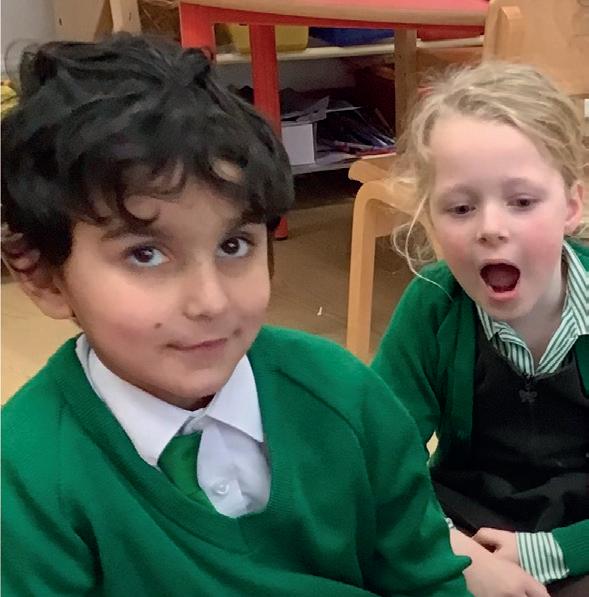
Many parents have a strong feeling either way. But if you don’t, it’s worth visiting both types of schools and asking staff what they see as the benefits and downsides so you can weigh these up.


Just as none of us look the same, everyone is born with tendencies towards certain learning styles when developing literacy, language and motor skills. Recognising your child’s learning style is important in understanding how they access their learning, particularly if they appear to be struggling in certain areas.
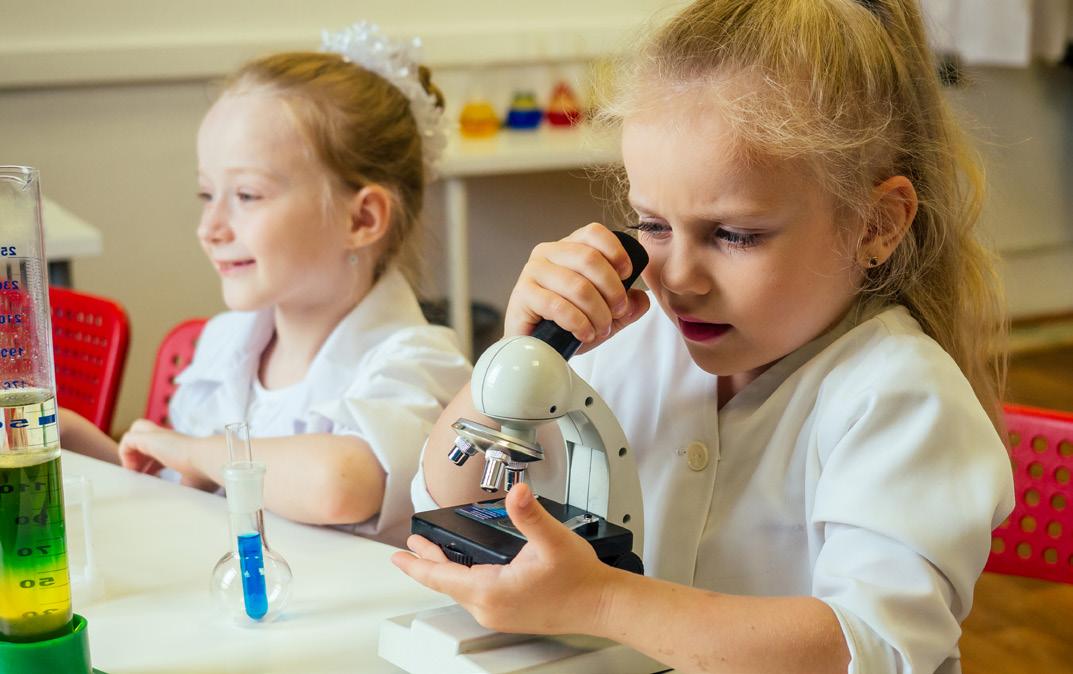
Visual learners rely on what they see. Encourage them to use visual aids, sit at the front of the class and write down or draw information.
Kinesthetic learners learn best through doing and moving. They benefit from using tools, acting out or role-playing new information and having freedom of movement.

Auditory learners learn best through hearing and listening. Engage in discussions about what they are learning, read stories out loud and repeat information.
Solitary learners absorb information independently of other people. Let them make notes and recite back, provide quiet learning spaces and give opportunities for sharing their learning. Verbal learners respond well to written or spoken words. Play word games, use rhymes, acronyms and mnemonics, read their writing aloud, encourage discussion and debate.
Logical learners use logic and structures in order to learn effectively. Provide problem-solving tasks, challenge them to work things out for themselves and have them verbalise ideas and answers.
Observe how your child naturally interacts with the world around them and also note weaknesses: what types of tasks do they find challenging?
Watch how your child expresses themselves. Children will be more expressive through their natural learning style. Auditory learners express themselves best through words whilst visual learners are more apt to reveal their emotions through facial expressions. Kinesthetic learners use more body language and may seem unable to stop themselves fidgeting.
Consider your child’s interests. These will likely reflect their learning styles. Auditory learners usually show an interest in music and sounds. Visual learners often have interests both in reading, watching TV and looking at interesting objects. With kinesthetic learners, look for an interest in physical activities.
See how your child solves problems. Children lean into their learning styles. Auditory learners tend to talk through and discuss possible solutions whilst visual learners use their eyes to solve problems. Kinesthetic learners will usually try to solve problems with their hands.
Lisa and Catherine are co-founders of Emparenting (www.emparenting.co.uk), supporting children, parents and families with the insights, skills and tools needed to nurture the development and well-being of the next generation.
As important as it is to understand and support your child with simple strategies to help them learn in the way that suits them best, it’s also helpful to encourage and embrace new ideas and a more flexible approach to their learning.

Recent research has concluded that teaching children to use one specific learning style over others may not be entirely beneficial within the classroom setting. Sticking to what you perceive as your preferred learning style can create limitations, giving a false belief that learning can only be managed in one particular way. The most important thing is for a child to have the time to self-reflect on how they learn best and to be encouraged to experiment with tackling problems from a variety of angles.
It is also important to note that over time a child’s learning styles can change as they develop and progress through their own personal growth and their educational journey. Every child is unique and learning style is just one part of the greater way that your child learns.
Tell us a bit about yourself?
Rhian Thornton, joined Upton House School as the Headmistress, seven years ago. Here she talks to Families about the school ethos, how it has evolved over the last few years and what makes a great teacher!

I moved to Windsor seven years ago to become Headmistress at Upton House School. My career prior had been in the State sector, previously Headmistress of an Ofsted ‘Outstanding’ school for 11 years in Cobham. My school worked with families moving into independent or state sectors at Senior school entry which I loved. As a family of five, with two daughters and a son, we moved because of Upton. We fell in love with its warmth, community, humility and success. We have now also added two fox red labs to the family, Elmo and Ernie!
How would you describe the Upton House ethos?
Upton’s values are the lifeblood of the school. You feel the fun, energy, achievement and innovation as you visit. Most importantly, kindness comes first, combined with open-mindedness and an aspirational resilient can-do attitude. We are very much a family and a big part of the community in Windsor since 1936! Our uniform is traditional and easily recognisable on The Long Walk where tourists are fascinated by the boaters and flat caps. However, the school with its music tech and recording studio as well as broadcasting curriculum and broadcasting studios, is charging ahead with technology, expanding the Upton family to those grandparents unable to be at school for those many precious moments.
How has Upton House evolved over the years and what have been the highlights?
Education is the greatest gift, not just academic achievement, but embracing, debating, questioning, introducing opportunity and expanding skills and knowledge for life. This belief embodies Upton and has fuelled the exciting growth and change in the last six years.
We now welcome boys into Prep and in September have our first Form 6 boys, following the move to fully co-ed in September 2020.
Knowing your children are happy, safe and thriving whilst you work is crucial, hence in 2018 we moved to a full 48week model for Little Upton to support working parents with nursery children. School can start at 7.45am and is open until 6pm. Our holiday team ensure the holidays are covered too, when needed. Value for money is very important to us, never more so than in this current climate. Specialist teachers from PreNursery in languages, sport, and music leading into all specialists from Form 3 results in wonderful achievements and results for every child. Adding Broadcasting into the curriculum with all the technological and creative skills it brings has definitely been a highlight, with the children leading the broadcasts, and a regular online extended family audience of over 22 countries.
Other highlights include the development of sport at Upton. This has been a key priority. No pool, no problem for Upton! We have a talented and dedicated swim team, squad training twice each week and have achieved great success in the IAPS swimming championship finals for the last two years. Fixtures are a key weekly part of Upton life and we are blessed to be able to hold home matches at the beautiful York Club in Windsor Great Park. Watching the sporting success blossom at Upton has been very exciting. With an experienced and talented sports team, sport is a key part of Upton and we love to feel good about our performances whether cricket, football, rugby, athletics, hockey or netball. Other highlights have included gaining the NACE Challenge
Award – external validation of schoolwide high quality provision/challenge for all - and the academic results and scholarships offered to our pupils in the last five years, despite Covid. This year for example - 62 offers for 27 pupils and 14 Scholarships were offered.
What are the most rewarding aspects of your work?
Seeing the children from 2 years of age to 11 years running into school smiling and not wanting to leave because they are so engrossed in their school life is without doubt the best part of my job. Our little Uptonians emulate their older role models. Happy faces, respect, laughter and friendships made.
What are the qualities of a great teacher?
Patience, listening and guiding, enabling progress through challenging questioning and discussion, outstanding subject knowledge and inspiring through fun with learning. Do you have any top tips for parents when they are considering a school for their child?
Every child is different. It is a very personal choice. Visiting the schools that interest you and talking to the Headteacher is so important. Children need an environment where they feel valued, can achieve and develop their individual talents and skills and where they feel comfortable to have a go at anything. An aspirational school, because they deserve that, but most importantly, a genuinely happy school.
For more information or to arrange a visit contact www.uptonhouse.org.uk You can also register for Upton House School’s Virtual Open Morning at 10am on Saturday 16th September.

As the new school year gets going, many parents will be anticipating talking to their child’s teacher(s) at a Parents’ Evening. Depending on the school, these consultations will happen at least once a year, sometimes more frequently. If your child is in Reception, this may be a new experience; if you have older children, you may have been to several or even many Parents’ Evenings already.
It’s almost impossible to ask questions of teachers at school drop-offs and pick-ups, so for most parents, the booked Parents’ Evening slot is the only real opportunity for a proper chat with their child’s teaching staff. Therefore it’s really important to maximise the time available in these one-to-one consultations and make sure you get all the information you need.
What to expect
While Parents’ Evenings will vary slightly in format from school to school and year to year, at a minimum you should expect to hear how your child is performing in numeracy and literacy against the expected levels for their age group.
Much more information will be conveyed as your child gets older. Consultations may also cover your child’s behaviour, levels of effort and social and emotional development.
Be prepared
This may sound obvious but unless you want to risk discovering that all the questions you want to ask have vanished from your head, write them down in the run up to Parent’s Evening to make sure you cover them.
Let the teacher speak
If you do have specific questions, it’s best to let the teacher speak first so that they can cover everything they need. The exception is if you need clarification or your question is related to what is being discussed at that moment.

Don’t compare
Try not to focus on comparing your child’s progress with his/her peers or even siblings. The teacher will focus on how your child is achieving against expected levels for their age. It isn’t useful to ask how their performance compares to others in the class. Stay focussed on your own child.
Focus on your child’s level of effort
Don’t underestimate the importance of effort. This is as important as achievement as it reveals a lot about your child’s behaviour, character and motivation. How your child gets on with teachers and peers socially is also very important.
For a quick overview
Ask about your child’s strengths and weaknesses. This will give you a good idea of their overall performance and help you identify the areas in which you should be offering more support at home.

Deal with unexpected news productively
You may hear something about your child that you are not expecting. If this is about a negative aspect of their behaviour or performance in a specific learning area, this may be difficult both to hear and accept.
Try not to get defensive. A teacher I spoke to told me of a consultation during which a father became very accusatory and angry, insisting that the teacher’s perception was incorrect as his child ‘didn’t struggle at home.’ If you do hear something unexpected, ask how you can work with your child to better support them. Teachers may have already prepared a response to this question in advance.
Writing notes
Don’t attempt to write more than a couple of bullet points while the consultation is happening, otherwise you may miss something important that’s being said.
Justina Gapper is mother of twins, journalist and communications specialist.
Write a summary
Now is the time to make a written record of what was said. This can be useful to show other family members but also as a reminder for yourself in the coming months.
Don’t worry, you can see the teacher again
Don’t fret too much if you do feel that there was something that you wanted to talk about but didn’t get the chance. Ask to meet the teacher again, even on a regular basis, if you feel this is warranted.
Parents’ Evenings are about your child, of course. If they are old enough, ask them which aspects of their learning or behaviour they think their teacher might bring up. Discuss it with them, so you are better prepared for the meeting. Note any questions they’d like you to ask.
Afterwards, highlight all the positives that came up. Talk with them about their teacher’s feedback, specifically any home support you might be able to offer if there are particular areas they’re finding more challenging.

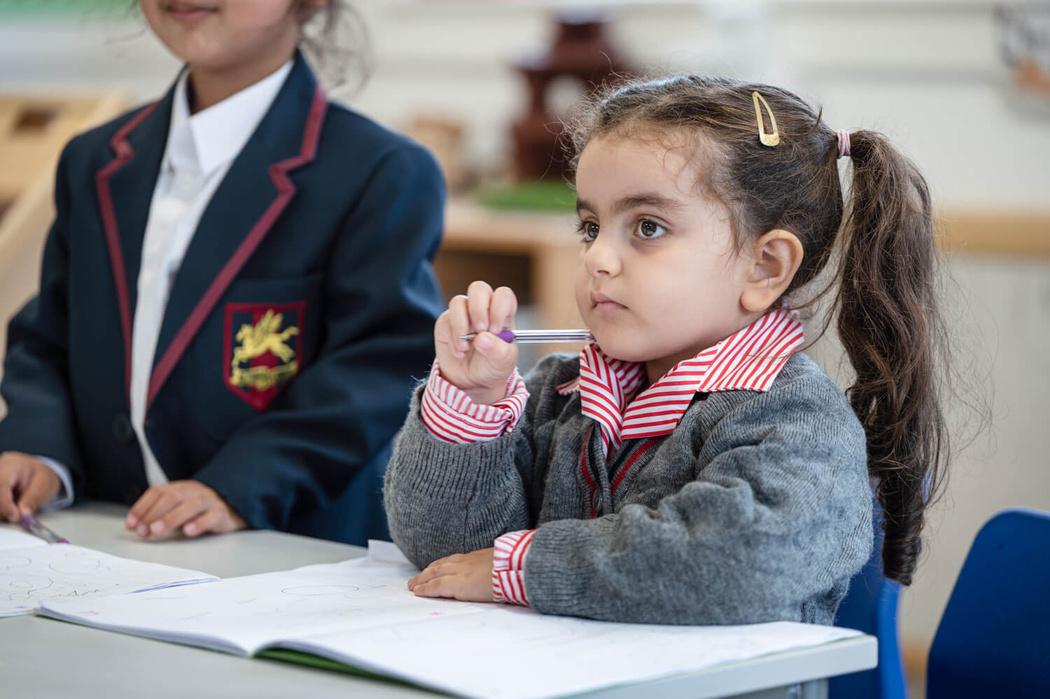

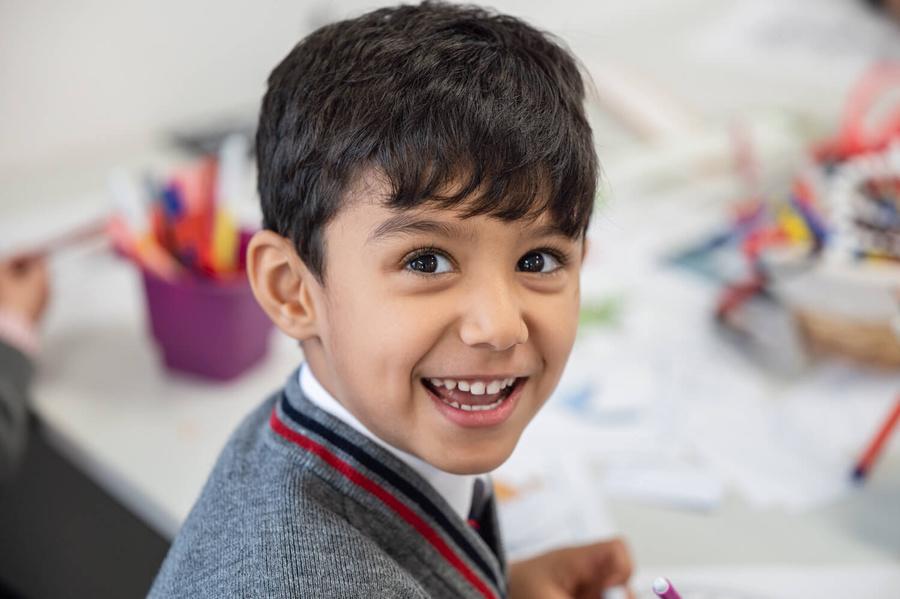
Ballet, modern, tap and Acro classes for beginners or advanced students, from 3 years and upwards.
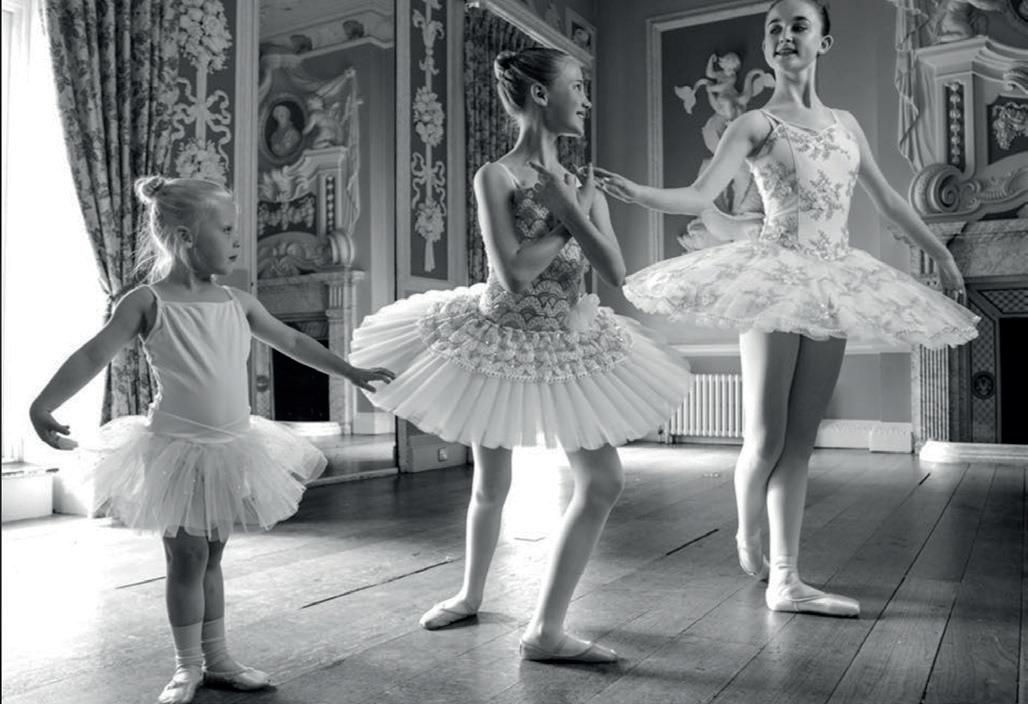
Weekdays: Braywick Leisure Centre & Holtspur Scout Hut, Beaconsfield HP9 1BH






Saturdays: BCA, Maidenhead
Call Candy Cox on: 01494 673919 candy@patsteelschoolofdance.co.uk www.patsteelschoolofdance.co.uk



Parents often ask how they can best encourage their children to move from one reading stage to the next during the primary school years.
When can I expect my child to read independently?
Children love ‘to do’ and will quickly move to reading independently when they feel the time is right. This can be as young as 5 years old or later, at around age 8. The majority of children will be reading SOME material independently by the beginning of Year 3.

How long should my child read for?
On average, by ages 5 to 7 years, children will enjoy a story together with you for fifteen to twenty minutes or spend five to ten minutes focused on a book by themselves - more if the pictures really grab them! Older children can sustain interest for longer. Some will even need to be prised out of the book.
When should my child move on from picture books?
Pictures offer vital clues to stories that new readers rely on. As a child’s confidence grows, you can introduce books with fewer pictures. The ‘Who Was’ book series is great transition material. But there are so many wonderful picture books for older readers that it’s fine for your child to include them in a wide range of reading material until the end of primary school.
Can my child alternate between independent reading and being read to?
Absolutely! Ideally, primary aged children need to read daily so
many parents continue to read to them on this basis. Reading to your child builds their confidence and understanding and exposes them to more sophisticated books than they can manage alone.
When can I phase out reading to them?
As children reach Years 5 and 6, parents need to be less involved in their child’s reading. However, children can be ‘fluent readers’ but still lack comprehension skills - this is the greatest weakness I have found in SATs and 11+ exams. So, a few times a week, parents can definitely make a difference by listening to their child read aloud and then talking to them about what they’ve read, discussing new vocabulary and characters or settings.
Gail Hugman owns and runs Human at Core (www.humanatcore com), which helps parents motivate and engage their children in developing a bright future. Human at Core works with children 1:1 online and offers tools, strategies and techniques that will boost parent’s confidence and expertise.

With the choices now available, selecting books can feel overwhelming for children. Here’s some thoughts on how to break down this process for your child.
Teach your child to think about the book cover that attracts them. This can be the very first indicator of whether they want to read the book.
Show them the blurb

Show them what it says on the inside sleeve.
Encourage them to read the first page or two. than four words that they find tricky, the book is likely to be too hard for them.
Ask their school to recommend

Ask their friends
Follow an interest your child has books about pets can be a good starting point. Look for books by an author they’ve enjoyed
Look at different sections what appeals.
Encourage them to give books a chance!

With high academic standards, high calibre staff and excellent pastoral care, Upton House children blossom and have a zest for life, continually learning and developing their abilities, interests and talents. We pride ourselves on developing confident and happy children with a love of learning.

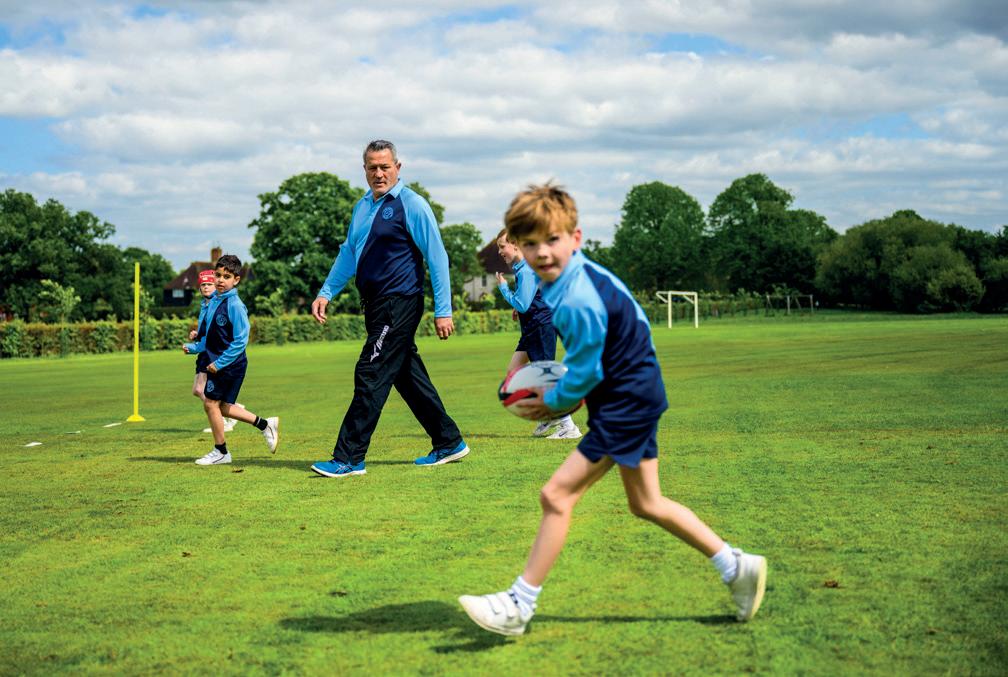

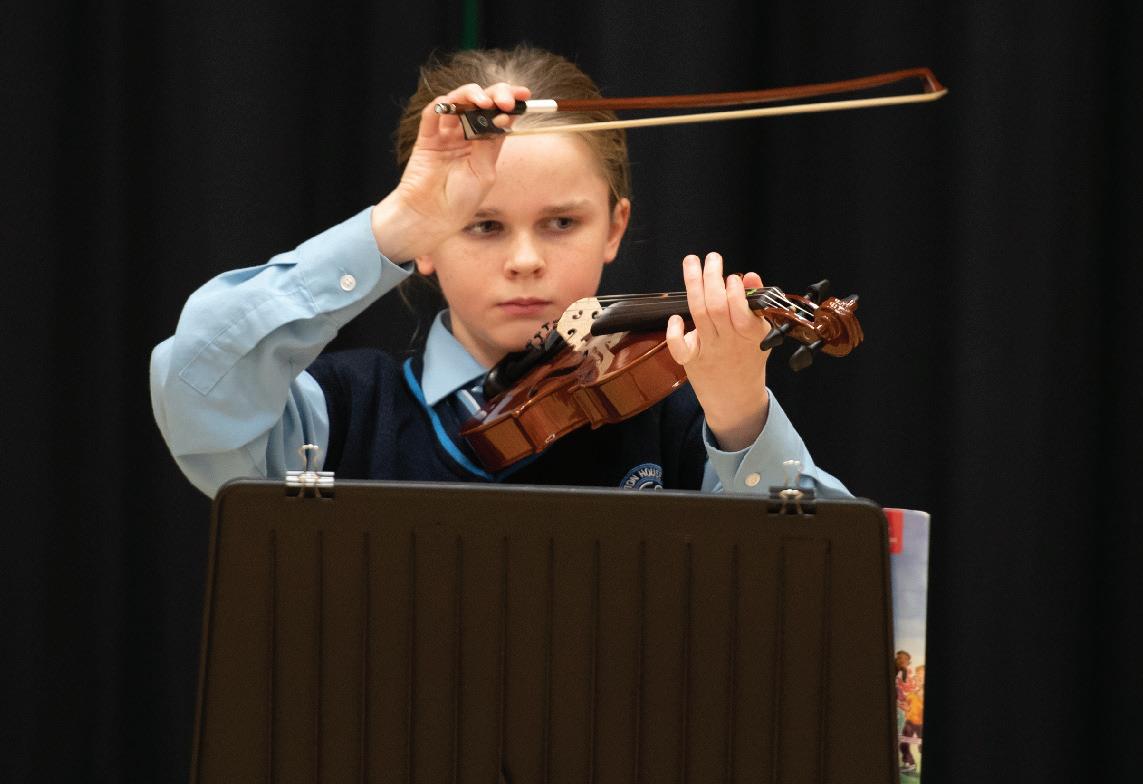

It can sometimes be tricky to encourage your child out of their reading comfort zone. My tips are:
Visit a book shop or library with your child and just browse. Look at the different types of books available and point out the sort of material you enjoy.
Read the first section or chapter of a new type of book to your child. Remember, your reaction to the book will influence whether your child engages with it.
Help your child research books by authors you know or have heard about.

Choose a ‘book of the month’ to share with the family over a special tea or dinner and get your child to do the same.
Buy a children’s book that appeals to you and share it with your child.
Encourage your older child to start or join a book club with friends and take turns to choose the type of book everyone reads.
Offer your child a broad range of reading material – comics, magazines, newspapers – First News is great for children.
Rote learning, spoon feeding, box ticking - no wonder so many children struggle to succeed in today’s world. ACS Egham’s challenging, proven, and truly modern IB programme gives children the tools they need to become independent learners. As one of only two schools in the UK to offer the entire IB programme, we are uniquely placed to create unforgettable experiences that transform the way children see the world.

Sensory activities enrich children’s play by encouraging them to engage their senses and explore and understand the world around them, sparking their imaginations and developing curiosity. Stimulating children’s senses supports their cognitive development, language and communication skills, physical, social and emotional development.
Sensory play can be magical - there are so many reasons why I love it. We discover the wonders that life brings when listening to birds in the trees and feeling grass between our toes. It offers little ones (and their grown-ups too) the freedom to explore, get messy, go wild and have heaps of fun. Sensory play can be incredibly simple too.
Here are some suggestions:
Ready, set, go! Your child can make super-simple cork sailing boats, then have a boat race across the bathtub. Safety first: don’t forget adult supervision is always required when a child is playing with water.
Go and grab… corks, elastic bands, triangular pieces of paper, colouring pens, cocktail sticks, an optional straw. A bathtub or tray of water.
Line up three corks in a row. Pop an elastic band around them at each end to hold them together.

Make a paper sail and use the colouring pens to make a pattern. Push a cocktail stick carefully through the sail for a mast (adults, probably best you do this), then slowly stick it into the middle cork.
Ready to set sail? Brilliant! Set the boats afloat in the bathtub or a tray of water and see which one crosses the finish line first. Sails need wind, don’t they? Show your child how to use a straw to blow wind into the sails. How fast can the boat go?
Let’s explore it!
Pop some toys on the boat. How many can it carry? Which toys are too heavy and sink the boat? Take the boats outside: can you sail them in a puddle?
It’s time to go exploring in the garden or park for differentcoloured leaves to make some beautiful nature confetti.

Go and grab… a collection bowl and some shape-punchers. Find a selection of leaves of different colours and shapes, avoiding prickly, stinging or dangerous plants. Slide each one into the shape-puncher and make holes all over the leaf. Fill the bowl with the little shapes, taking care to keep little fingers clear of the puncher. What will your child want to do with their nature confetti - stick it on a picture maybe, or sprinkle it on the grass?
Let’s hear it!
What sounds can your child hear outside? Leaves rustling, bees buzzing, birds singing and dogs barking…
Katie Still (aka Instagram’s Playful Wonders) is the author of Playful Wonders, a new book jam-packed with sensory play ideas. The book is published by DK and available from www.bookshop.org
Let your child’s imagination run wild by creating some story stones to invent their own story!
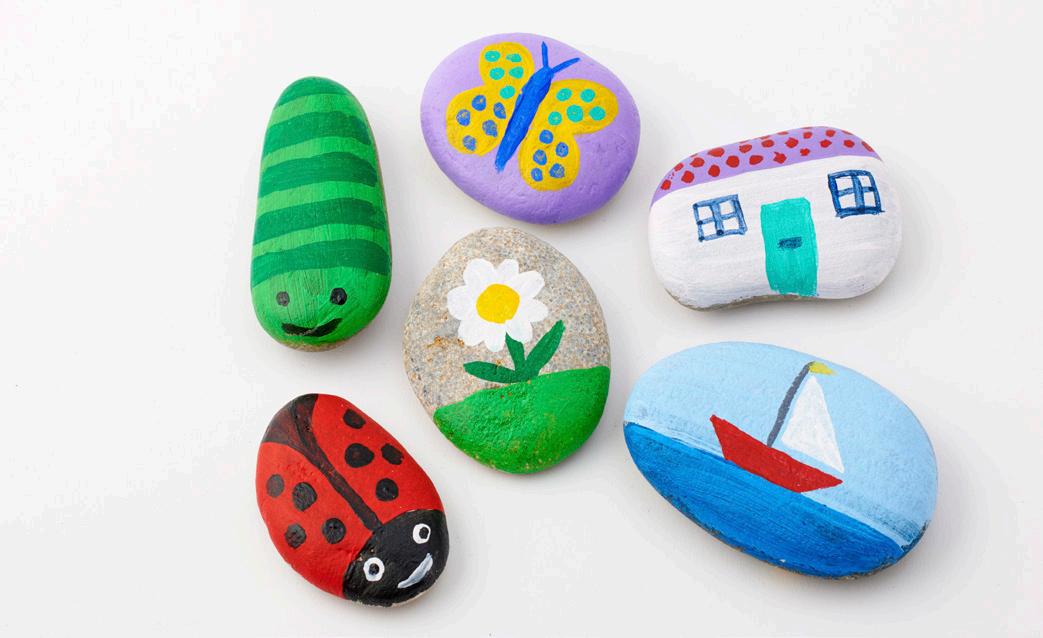
Go and grab… paints and paintbrushes or colouring pens. A small bag or basket. Storybooks if you need some inspiration. Go outside and collect some stones. Can you help your child find flat-ish ones that are all different shapes and sizes? Next, ask your child what they will paint on their story stones. Maybe characters from a book or animals; or simply things that they love? If drawing is too tricky, your little one can use stickers on their stones.
Once they’ve finished, pop the stones into the bag or basket and your child is ready to play. Ask them to take out the first stone. What drawing is on it? It’s over to them to make up a story around it; they decide what happens! Then they pull out a second stone - what’s the next part of the story…?
Let’s make it!
What sounds can your child make to accompany their story: the splash of waves maybe or the hum of an insect?
 By Sarah Ockwell-Smith
By Sarah Ockwell-Smith
The ‘terrible twos’ aren’t called that for nothing! This stage of a child’s life is all about big feelings. Scientifically, it relates to the undeveloped prefrontal brain cortex which means the child is unable to regulate their own emotions. What most of us refer to as a tantrum is an expression of pure frustration.

What is a tantrum?
Tantrums describe the state of an individual who is out of control, full of big emotions and stress hormones and unable to calm themselves down. Tantrums can happen at any age, right into adulthood but, as adults with fully developed brains, we have to learn to manage our emotions, calm ourselves down or rather self soothe.
Toddlers don’t possess these skills yet. They are not being naughty or manipulative, they are simply being toddlers. Tantrums are a normal and exceedingly common feature of child development. Research has found that nearly nine in ten children between age 18 months and 2 years regularly have tantrums, with most having at least one a day, lasting on average between thirty and sixty seconds (although it is not uncommon for them to occur far more frequently and last for much longer).
Contrary to popular belief, ignoring, shaming or punishing tantrums can make a toddler’s behaviour much worse. These approaches ignore a child’s difficult underlying feelings and don’t resolve the cause or help the toddler regulate their behaviour. Experts have discovered just how much infant brains are affected by the level of parental care they receive.
With nurturing attention, the part of their brains responsible for regulating emotion become better connected as they grow. If toddlers are constantly sat on naughty steps, sent for time outs, punished or ignored when they are perceived to be ‘naughty,’ in the long term they will lack the neurological maturity that develops as a result of empathy and guidance.
In the 1960s, an English psychoanalyst named Wilfred Bion introduced his idea of using containment when children are not yet able to manage their feelings alone. The concept describes the way parents or primary caregivers hold space for a children’s big, difficult feelings like anger, frustration and anxiety during a tantrum, by reflecting calmness, control and regulation, helping the child to become calmer. Importantly, the child feels safe and understood.
Sarah Ockwell-Smith is the author of Beginnings, a book published by Piatkus, which offers a guide to child psychology and development for parents of children ages 0 to 5.
of child development, caused by immature brain development. In time your toddler will grow out of them. Until then understanding and a lot of patience is the best way forward.

Try to identify and reduce triggers to prevent tantrums where you can. This might be when your child is hungry, doesn’t want to share their favourite toy or walk a single step more.

Keep the toddler (and others) safe during the tantrum. If you can, move to a quieter space with your child. Stay calm and hold your boundary; supporting and nurturing isn’t about giving in.
Help your toddler to calm down once the tantrum is over. Distraction can be a good technique, pointing them towards something more pleasant to focus on.
The best way to show care during tantrums is to mirror calmness yourself. Easier said than done in a supermarket aisle admittedly but the rewards will be there in the long term.
Well, as the parent or carer, you are responsible for all the big decisions around bedtime, meal time and the day’s activities. Your developing child may have other ideas, however.
Q. My toddler’s favourite words at the moment are ‘me do it.’ If I don’t let her do whatever it is, then she has a huge tantrum. What can we do?

A. Toddlers really struggle with a desire for independence and an innate drive for autonomy. It’s all part of growing up and learning to be confident without you, which is a good thing in the long term. As important as it is, it’s also incredibly frustrating!
The answer is to offer your toddler as much control as possible over areas of her life where it’s age appropriate. For instance, allowing her to choose her own clothes in the morning, letting her direct her own play and giving her choices at mealtimes. The more control she is given by you, the less she will feel frustrated and tantrum.
According to Swim England, nearly two thirds of parents and guardians of children ages 7 to 11 haven’t been swimming with their children in more than a month. They’re missing out: regular family swims can be enjoyed whatever the weather and help children develop their swimming ability more quickly.

If you’re booking your child in for swimming lessons, here’s how Swim England recommends supporting them:
Lessons are fun. Learning how to swim should be fun, so check with the lesson provider that games and activities are regularly included within their programme of teaching.

Timing is key. Book lessons for a time that is easy to fit around your family commitments.
Pay attention. If you are poolside during lessons, be ready to give your child a wave and lots of encouragement. Putting away your mobile will help your child understand that these lessons are important.
Celebrate their swimming milestones. Rewarding children keeps them motivated to improve in their lessons. Swim England’s Learn to Swim Awards and app give children regular celebrations of their swimming milestones.
Regular reports. Parents should expect regular updates either through reports or verbal feedback. If your child is struggling in lessons, talk to the swimming teacher and ask what you can do to help encourage them. If they haven’t started swimming lessons yet, visit the pool before lessons to get your child used to the environment.

Don’t end lessons too early. Water competency is often misinterpreted by parents and guardians as child being able to jump into a swimming pool and being able to put their face in the water. The reality is very different.
Learning to jump into a swimming pool is an important safety skill that is often achieved in the early stages of your child’s learning to swim journey. It is a skill which mimics the motion of falling into water and teaches swimmers to get themselves safely to the side without panicking.
However, there are many other water safety and survival skills that a child needs to learn before they are safe in water, such as floating and treading water.
So don’t be tempted to stop your child’s lessons before they are competent swimmers and have achieved Swim England’s minimum water competency standards.
For further information, visit www.swimming.org



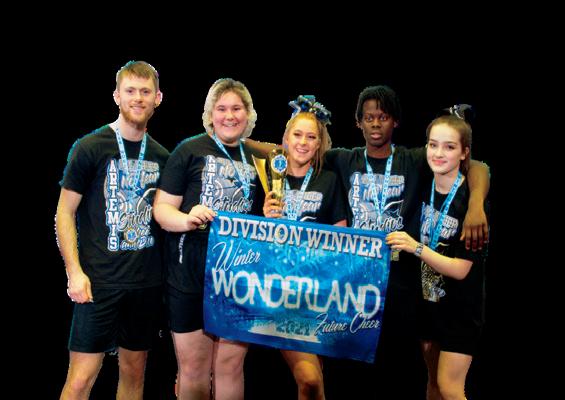
Swim England’s minimum water competency standards offer a clear set of skills that should be achieved before a child stops swimming lessons. The four competencies are:
Perform a star float for at least sixty seconds;







Tread water for at least thirty seconds;
Have experience of swimming in clothing;

Swim at least one hundred metres with ease and without
Research in September 2021 highlighted that more than three million 7 to 11 year old children were not achieving this standard, with just four percent of the age group being classed as ‘water competent.’ Swim England strongly recommends that where possible, parents and carers keep children in swimming lessons until they have completed Learn to Swim Stages 1 to 7 as a minimum. By this point children will have achieved all four of the minimum standards for water competency and will be much safer if they get into trouble.
See more at https://bit.ly/SwimPathway
Adult supervision is crucial to keeping young people safe in, on and around the water but have you ever thought about whether the colour of your child’s swimwear could make a difference in preventing drowning? If the worst did happen, being able to quickly find a child in the water could save vital seconds and be the difference between a fatal and non-fatal incident.
Swimwear colour makes a huge difference to whether a child can be seen even on the surface of the water, let alone if they are underwater. The colour of the bottom of the pool will make a difference but when buying your child’s swimwear, think bright, neon, contrasting colours which are always easiest to see in a swimming pool.
For swimming in an outdoor setting, the results are the same. The caveat for this is that open water settings, such as beaches and rivers, also come with various hidden dangers such as tides and currents to consider before allowing your child to swim.
Family holidays are opportunities to spend quality time together while making unforgettable memories. With cost always a factor though, booking ahead can offer the benefits of low deposits, discounts and even free child places. Plus you have more time to get excited and have something to look forward to! If you’ve not booked a family trip for 2024, here are some fabulous ideas.
Crete
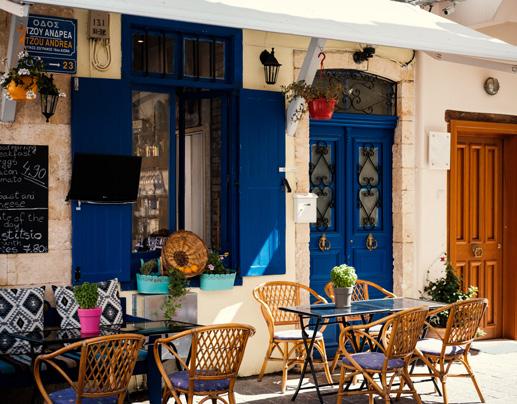
Explore the largest of the Greek islands. For younger kids there are many quiet beaches and secluded coves. For the bigger ones, theme parks, aquariums and water sports are easy to come by. Should you squeeze in a chilled ‘adult day,’ laid back boat trips and snaking coastal walks promise spectacular sea and valley views. This island really does have something for everyone.
Consider booking Abu Dhabi over Dubai for winter sun. It’s more relaxed, very well suited to families of all ages and has a less chaotic feel to it. Familyfriendly activities include Ferrari World, waterparks, snorkelling, diving, kayaking and relaxing sunset cruises. There is even a Warner Bros World!

Explore beyond the Algarve on a fun road trip. Even in the summer motorways tend to be quiet, making it easy to explore a variety of regions, each with its own unique character. There are so many fun routes to explore which take in long golden beaches, hilltop medieval villages, famous vineyards, the natural beauty of the islands and delicious food.

This can be a magical, great outdoor destination for family holidays and breaks. Whether bathing in one of the many lakes or rivers, up high, climbing a mountain on a hike or cycling through unique landscapes, Switzerland is a paradise for summer outdoor adventures.

Consider a family trip to Sweden in summer. You can relax and explore in equal measure. Enjoy the pure bliss of jumping into lakes, kayaking and swimming in the sea. Rest your head in a tent for some wild camping or book into a comfy boutique hotel. From staying in the unspoilt nature of Swedish Lapland to exploring Stockholm and its vast archipelago, Sweden is a dream for nature lovers and adventurous travellers.


Connected to the mainland by bridge and also accessible directly by air, this island is lesser known and there’s no need for ferries. Krk’s natural beauty and numerous activities like scuba diving, go karting or simply just relaxing on one of the many lovely beaches and coves make it perfect for families.
For stunning scenery and beautiful beaches, year-round sunshine and enough breeze to keep young children cool, Mauritius is perfect both for summer and Christmas holidays. This wonderful island is extremely familyfriendly with plenty of hotels, restaurants and activities which cater well for families.


For a long haul adventure, this is a great option. Travelling with children is easy, with welcoming locals and great domestic travel options helping you to explore with ease. From the hustle and bustle of Bangkok to the chilled out vibes of island life, there’s something for everyone.
Ashley Lutz is a Travel Counsellor with seventeen years’ experience working with families to find inspiring holidays best suiting their wants, needs and budget. More info at www.travelcounsellors.co.uk/ashley.lutz
Girlguiding has been a part of millions of girls’ lives for one hundred and thirteen years and counting. Set up because girls wanted an equal world with the same opportunities as boys, impressive progress has been made since it began. But things can still be tough for girls. With many facing high expectations and anxieties in every area of their lives, they can be limited by gender stereotypes and face barriers to accessing the things they need to feel happy.
In Girlguiding’s annual Girls’ Attitudes Survey, two in three girls and young women ages 11 to 21 said that being part of a youth organisation makes them feel accepted and more connected to others. Girls in Girlguiding are more confident than their peers, with nearly nine in ten saying they like being the way they are, compared with just six in ten who have never been in Girlguiding.


Youth groups such as Girlguiding and Scouts are equipping young people with transferable life skills such as leadership, money management and teamwork. A recent report from Demos has demonstrated how skills learnt from Scouting can make a significant difference to employability.

Guides today can still earn badges, in an updated programme which includes mindfulness, self-care and media criticism. Girls are also supported to develop emotionally, mentally and physically so they can make a positive contribution to their community and the wider world.
Empowering girls for more than a hundred years, Girlguiding is committed to doing the same today, with a keen focus on what drives, challenges and excites girls. Whether that’s the thrill of

trying a new activity, singing around a campfire, enjoying the buzz of earning a new badge or emailing her MP about the issues she cares about; it’s a space where she can be herself, get creative, explore and most of all, have fun.
Meanwhile, Scouting embraces an inclusive Skills for Life strategy that encompasses teamwork, leadership and resilience and this has not gone unnoticed in the world of employment. The report highlighted that over half of Scouts felt ready for the world of work compared to a third of those who did not participate in any extra-curricular activities. With many employers struggling to hire people with teamwork skills or emotional resilience, these transferable skills are currently in huge demand.

For more information about joining Girlguiding visit www.girlguiding.org.uk and Scouts www.scouts.org.uk

UNTIL SPRING 2024
BRILLI-ANT: HOW SOMEONE SMALL CHANGED
A BIG STORY
The Story Museum 42 Pembroke St, Oxford OX1 1BP
Travel through anthill tunnels, searching for clues and stories! www.storymuseum.org.uk
MONDAYS IN SEPTEMBER AND OCTOBER
WELL BABY CLINIC
Riverside Children’s Centre, Maidenhead SL6 7JB
Also: Tuesdays: The Manor Family Hub, Windsor SL4 3HD
Thursdays: Datchet Children’s Centre, SL3 9EJ (SatNav SL3 9ER)

Fridays: Boyn Grove Library, Courthouse Road, Maidenhead, SL6 6JE
First Wednesday of the month: Ascot Durning Library, High Street, Ascot, SL5 7JF www.rbwm.afcinfo.org.uk
MONDAYS IN SEPTEMBER AND OCTOBER
NURTURE GROUPS (BIRTH TO 12 MONTHS)
Riverside Children’s Centre, Maidenhead SL6 7JB
Windsor SL4 3HD
Fridays: Datchet Children’s Centre, SL3 9EJ (SatNav SL3 9ER) www.rbwm.afcinfo.org.uk
SATURDAYS IN SEPTEMBER AND OCTOBER
OCEAN YOUTH DRAMA (OCEAN THEATRE COMPANY)
Ascot
Term time. 10-11.30am. Age 9-13 info@oceantheatre.com www.oceantheatre.com/ocean-youth
SUNDAY 3 SEPTEMBER
THE KITE FESTIVAL (HOSTED BY NORDEN FARM) Boyne Grove Park (Punt Hill), Maidenhead 12-4pm. Music, food and bar. www.norden.farm/events/community-kitefestival
MONDAY 4 AND MONDAY SEPTEMBER 18
MINI MONDAYS
Iver Environment Centre, Slough Road, Iver SL0 0EB
Theme: Sunflowers
Don’t forget to book car parking ticket 10am-12pm. 2-5 yrs www.iverenvironmentcentre.org/what-wedo/event-listings
Maidenhead SL6 4PF
A new stand-up show about the joys of raising children with special needs. www.norden.farm/events/ashley-blakernormal-schmormal
FRIDAY SEPTEMBER 15
HARRY POTTER AND THE PHILOSOPHER’S STONE Waddesdon Manor, Aylesbury HP18 0JH Outdoor Luna Cinema. www.thelunacinema.com/venue/ waddesdon-manor
SATURDAY SEPTEMBER 16
SUITCASE STORIES
The Story Museum, 42 Pembroke Street, Oxford OX1 1BP
Puppet fun and stories for the early years. 11am. £9.
Also Saturday Oct 14. www.storymuseum.org.uk/whats-on
SATURDAY SEPTEMBER 16 TO SUNDAY OCTOBER 1
WINDSOR AUTUMN FESTIVAL
Various venues, Windsor www.windsorfestival.com/autumn-festival
Also: Wednesdays: The Manor Family Hub,
Please find below a proof of your adver tisement for the Januar y/Februar y 2017 issue (No. 88) of Families TVE.
FRIDAY SEPTEMBER 8
NATURE TOTS
Please CHECK ALL INFORMATION IS CORRECT especially dates, telephone numbers and addresses.
Any changes need to be made at this stage . Any fur ther amendments will be charged for
Windsor Great Park Environmental Centre (access is via Forest Gate SL4 2BY) 10-11.30am. Booking essential. www.bbowt.org.uk/events
SATURDAY SEPTEMBER 9
NIGHT MARKET
Please contact us by return either to amend or approve your adver tisement

Norden Farm Centre for the Arts, Maidenhead SL6 4PF www.norden.farm/events/norden-farmmarket
SATURDAY SEPTEMBER 9 AND SUNDAY SEPTEMBER 10
MAIDENHEAD AND COOKHAM ARTS TRAIL
Various venues
MUSIC CLASSES FOR THE 2s TO 8s Tuesday afternoons & Saturday mornings
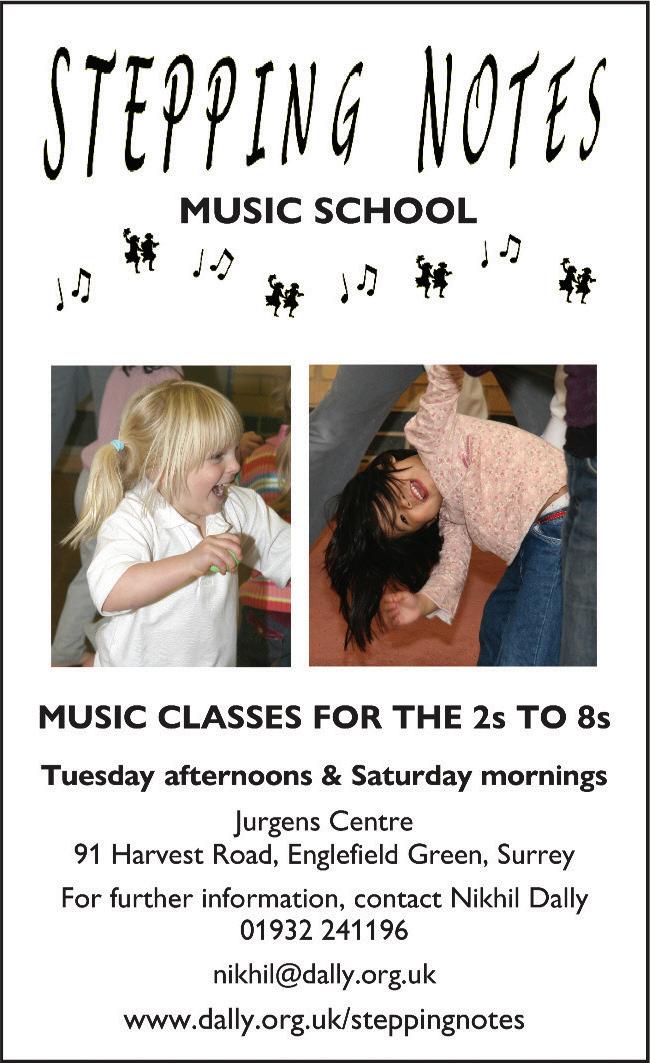

Jurgens Centre 91 Harvest Road, Englefield Green, Surrey
FRIDAY 22 AND MONDAY SEPTEMBER 25
T: 01628 627586
NATURE TOTS
E: editor@familiestveast.co.uk

Woolley Firs Environmental Education Centre SL6 3LJ
50 All Saints Avenue , Maidenhead, Berkshire , SL6 6NA
Booking essential. 18 months to 4 yrs www.bbowt.org.uk/events?type=1022
SATURDAY SEPTEMBER 23 TO SUNDAY OCTOBER 8
Map available through website www.camat.org.uk
MONDAY 11 AND SEPTEMBER 25
COMMUNITY EXPLORERS
Iver Environment Centre, Slough Road, Iver SL0 0EB
Explore the site, have a cuppa! Don’t forget to book car parking ticket 5-7.30pm. 3-10 yrs www.iverenvironmentcentre.org/what-wedo/event-listings
TUESDAY SEPTEMBER 12
BATS FOR BEGINNERS
Woolley Firs Environmental Education Centre, Cherry Garden Lane SL6 3LJ
7.30-9.30pm
www.bbowt.org.uk/events/2023-09-12bats-beginners-talk-and-walk-woolley-firstuesday-12-september
THURSDAY SEPTEMBER 14
NORMAL SMORMAL
Norden Farm Centre for the Arts,
WINDSOR FRINGE FESTIVAL Various venues around Windsor www.windsorfringe.co.uk
THURSDAY 28 TO SUNDAY OCTOBER 1
THE TINY IDEAS FESTIVAL
The Story Museum, 42 Pembroke Street, Oxford OX1 1BP
Sept 28: Bloom: Garden play with Tiny Light Theatre and Wild Boor Ideas.
Sept 28: Seed: Multisensory Puppet experience
Sept 29: Nature: Sensory Story time with Starbright Arts
Sept 30: Babble: Mik and Kin need your help to sooth giggles!
Oct 1: Cardboard Carnival
Mainly aimed at early years. www.storymuseum.org.uk/whats-on
FRIDAY SEPTEMBER 29
ALICE IN WONDERLAND
The Old Court, Windsor, SL4 3BL Ballet for the whole family. www.tickets.oldcourt.org/sales/events/ alice-in-wonderland
Please email editor@familiestveast.co.uk with any events. Event times and dates do change, please try and check that an event is still going ahead before you head out.
SATURDAY SEPTEMBER 30
COMIC CLUB PLUS
The Story Museum, 42 Pembroke Street, Oxford OX1 1BP 12+. £12. www.storymuseum.org.uk/whats-on
MONDAY 2 AND MONDAY OCTOBER 16
MINI MONDAYS
Iver Environment Centre, Slough Road, Iver SL0 0EB
Theme: Leaf fall
Don’t forget to book car parking ticket 10am-12pm. 2-5 yrs www.iverenvironmentcentre.org/what-wedo/event-listings
SATURDAY 7 AND SUNDAY OCTOBER 8
STICK MAN
Wycombe Swan, St Mary Street, High Wycombe HP11 2XE www.wycombeswan.co.uk
MONDAY OCTOBER 9
COMMUNITY EXPLORERS
Iver Environment Centre, Slough Road, Iver SL0 0EB
Explore the site, have a cuppa! Don’t forget to book car parking ticket 5-7.30pm. 3-10 yrs
www.iverenvironmentcentre.org/what-wedo/event-listings
FRIDAY 13 AND SATURDAY OCTOBER 14
KINDER
Norden Farm Centre for the Arts, Maidenhead SL6 4PF
Escaping on a Kindertransport train, one small Czech-Jewish girl embarks on a mighty adventure. Puppetry produced by Smoking Apples. www.norden.farm/events/kinder
SUNDAY OCTOBER 15
HARRY POTTER BOOK DAY
The Story Museum, 42 Pembroke Street, Oxford OX1 1BP 7+. Free with admission. www.storymuseum.org.uk/whats-on
SATURDAY OCTOBER 21
THE AMAZING BUBBLE MAN
The Curve, William Street, Slough www.curvevenue.uk
SATURDAY 21 TO SUNDAY OCTOBER 29
SONNETS AND BONNETS - 400 YRS OF SHAKESPEARE
Pug Yard Learning Centre, Windsor Castle, Free Shakespearian themed crafts, dressing-up and castle trails. Free on admission.
SATURDAY 21 TO SUNDAY OCTOBER 29
PUMPKIN FESTIVAL
Odds Farm, Wooburn Green HP10 0LX Head to the Pumpkin Patch to pick your own pumpkin ready to carve over at Carving Corner. Halloween-themed Arts & Crafts and many more spooky surprises. www.oddsfarm.co.uk/pumpkin-festival
SATURDAY 21 TO SUNDAY OCTOBER 29
HALLO’WELLY’WEEN
Wellington Country Park, Odiham Rd RG7 1SP www.wellingtoncountrypark.co.uk/whats-on/ hallowellyween
MONDAY OCTOBER 23
COMMUNITY EXPLORERS
Iver Environment Centre, Slough Road, Iver SL0 0EB
Explore the site, have a cuppa!
Don’t forget to book car parking ticket 5-7.30pm. 3-10 yrs
www.iverenvironmentcentre.org/what-wedo/event-listings
MONDAY OCTOBER 23
FAMILY FUN DAY
Iver Environment Centre, Slough Road, Iver SL0 0EB
Don’t forget to book car parking ticket 10am-12.30pm or 1.30pm-4pm. 3-11 yrs
www.iverenvironmentcentre.org/what-wedo/event-listings
MONDAY OCTOBER 23
MR CHIRRUP’S GLOBAL BUG SAFARI
The Story Museum, 42 Pembroke Street, Oxford OX1 1BP 7+. £9 www.storymuseum.org.uk/whats-on
MONDAY 23 TO WEDNESDAY OCTOBER 25
THE WILD WITCH’S HALF TERM TRAIL
Woolley Firs, Cherry Garden Lane Maidenhead SL6 3LJ
Join the spooky Halloween-themed trail through their nature reserve. https://bit.ly/3DuRulV
TUESDAY 24 OR WEDNESDAY OCTOBER 25
DROP OFF DAY
Iver Environment Centre, Slough Road, Iver SL0 0EB 10-4pm. £35 per child (£30 for sibling). 7-11 yrs
www.iverenvironmentcentre.org/what-wedo/event-listings
TUESDAY 24 TO THURSDAY OCTOBER 26
STORY EXPLORERS: EARTH, WIND AND FIRE
The Story Museum, 42 Pembroke Street, Oxford OX1 1BP October half-term workshop for ages 8-12. Spooky focus for Halloween! www.storymuseum.org.uk/whats-on
WEDNESDAY OCTOBER 25
SANSKRUTI DANCE PRESENTS APPLE ‘N’ SPICE
The Curve, William Street, Slough Introducing children (3+) to Indian storytelling https://curvevenue.uk
WEDNESDAY OCTOBER 25
JURASSIC EARTH
Wycombe Swan, St Mary Street, High Wycombe HP11 2XE www.wycombeswan.co.uk
THURSDAY OCTOBER 26
GRETA AND THE GIANTS
The Story Museum, 42 Pembroke Street, Oxford OX1 1BP
A creative climate protest workshop. www.storymuseum.org.uk/whats-on
THURSDAY OCTOBER 26
BOTOWN
The Curve, William Street, Slough
The UK’s leading Bollywood live music act. For all ages. https://curvevenue.uk
FRIDAY OCTOBER 27
STORY SHAPERS - NEW SUMMER COURSES
Ages 12-16
The Story Museum, 42 Pembroke Street, Oxford OX1 1BP
Book 1 day or all 5. www.storymuseum.org.uk/whats-on
FRIDAY OCTOBER 27
HALLLOWEEN AND FAMILY ACTIVITY EVENING
Iver Environment Centre, Slough Road, Iver SL0 0EB
Spooky trails and activities. Bring a torch. 4.30pm-7pm. 3-11 yrs
www.iverenvironmentcentre.org/what-wedo/event-listings
SATURDAY OCTOBER 28
KEVIN CRUISE’S HALLOWEEN SPOOKTACULAR
The Old Court, Windsor, SL4 3BL bit.ly/3DDnunH
SATURDAY OCTOBER 28
COMIC CLUB PLUS
The Story Museum, 42 Pembroke Street, Oxford OX1 1BP !2+. £12. www.storymuseum.org.uk/whats-on
SATURDAY OCTOBER 28
ALL HANDS ON DECK
Iver Environment Centre, Slough Road, Iver SL0 0EB
All welcome to pitch in with groundwork and gardening. 14+ with an adult www.iverenvironmentcentre.org/whatwe-do/event-listings
FRIDAY NOVEMBER 3
ANASTASIA THE MUSICAL (OCEAN THEATRE COMPANY)
BritVic Theatre, LVS Ascot SL5 8DR www.oceantheatre.com
SUNDAY NOVEMBER 5
BURNHAM FIREWORKS & FAIR Burnham Park, Bucks SL1 7HR bit.ly/479xyTe
NOVEMBER
LOOK OUT FOR:
Marlow Bottom Fireworks
Boyne Hill Cricket Club Fireworks (Maidenhead)
White Waltham Fireworks
Ascot Races Fireworks
Cookham Scouts Fireworks


